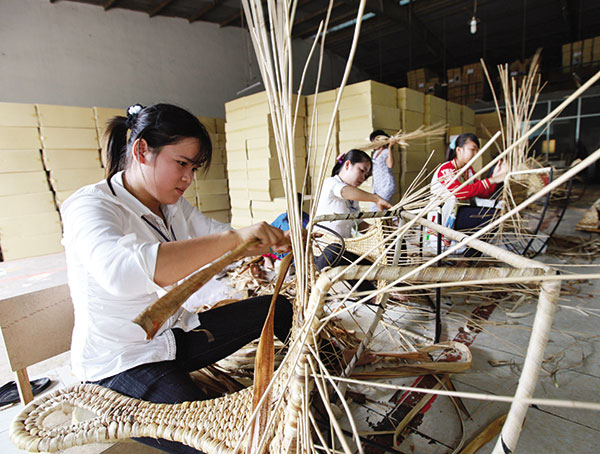IFC plans to ramp up banking loans
 |
| World Bank Group’s IFC seeks to boost private investment activity in Vietnam in 2018, Photo: Le Toan |
“At IFC, we’re keen to do more here. This is a priority country for us and it’s a priority because we think the outlook is good. So we’d like to achieve $800-900 million this fiscal year, [and it] could be a record year for investment in Vietnam for IFC,” said Kelhofer in an interview in Hanoi last week.
As far as the international financial institution is concerned, a well-functioning financial sector is crucial to a growing market. After repeated analysis of the capital needed, including the equity capital needed in the banking sector, IFC believes that it has room to fit in as one of the largest, if not the largest, emerging market investors around the world.
“We’re keen on doing more in the financial sector. This includes targeting specific aspects such as gender finance – promoting access to finance for woman entrepreneurs, which we believe is a priority market around the world and has been well received in Vietnam – financing for small- and medium-sized enterprises (SMEs), and green finance,” he added.
In the past years, IFC has provided local banks such as An Binh Bank (ABBank), Vietnam International Bank (VIB), VPBank, and TPBank with various financing packages. This is part of an attempt to address the key development challenges in the country, including the financing gap faced by micro-enterprises and SMEs and the lack of affordable housing in big cities.
Late last year, IFC joined Goldman Sachs’ ‘10,000 Women’ project to provide ABBank with a syndicated senior loan worth $110 million, ultimately aimed at helping the lender triple its SME portfolio and increase the extent of its lending to women-owned SMEs over the course of five years. The amount is said to be the first phase of a total $150 million financing package that IFC is arranging for the lender, $40 million of which comes out of IFC’s own budget, while the remainder is committed by other international lenders.
VIB also received $185 million in a syndicated loan from IFC last year, while VPBank was provided with a $57 million convertible loan, both targeted at helping the lenders further expand their lending to SMEs. In late 2016, IFC also invested $18.35 million in TPBank in exchange for almost 5 per cent of the bank’s stakes.
According to the IFC country head, Vietnam ended 2017 on a high note, with economic growth reaching over 6.8 per cent and foreign exchange strengthened and stabilised with FX reserves reaching some $53 billion. Additionally, rates are coming down, evidenced by the T-Bond rates, the dollar- and local currency-denominated rates, and the 108-point dip in credit default swaps.
“Vietnam is de-risked, which is great, because that means the ability for an investor to mobilise capital comes at a lower cost, which means entrepreneurs can now go further in Vietnam with the same amount of money,” noted Kelhofer.
IFC’s investment decision is also backed by the country’s decision makers focusing on stability for growth and the fact that Vietnam is a well-diversified economy, which does not rely on one commodity or one export market, according to Kelhofer.
“When [you see] record-high foreign direct investment (FDI) in one year, you would think that job creation will probably go up in the next year. If it’s coming down, you would think it should be easier to invest in things going forward. Overall, the trade market is largely okay. I don’t see any large dark clouds on the horizon, and this is why you see the record number of FDI and rates coming down in Vietnam. It’s not just the IFC thinking this, it’s the opinion of investors around the world,” he added.
What the stars mean:
★ Poor ★ ★ Promising ★★★ Good ★★★★ Very good ★★★★★ Exceptional
Related Contents
Latest News
More News
- New rules ease foreign access to Vietnam equities (February 05, 2026 | 17:29)
- 0.1 per cent tax proposed on each transfer of digital assets (February 05, 2026 | 17:27)
- Ministry of Finance tightens policy delivery at start of year (February 05, 2026 | 17:26)
- Vietnam steps up market reforms as FTSE Russell reviews upgrade progress (February 05, 2026 | 17:20)
- 2025 profits mixed amid strong energy and farming results (February 05, 2026 | 17:18)
- Cashless payments hit 28 times GDP in 2025 (February 04, 2026 | 18:09)
- SSIAM and DBJ launch Japan Vietnam Capital Fund (February 04, 2026 | 15:57)
- Banks target stronger profits, credit growth in 2026 (February 04, 2026 | 15:43)
- Vietnam on path to investment-grade rating (February 03, 2026 | 13:07)
- Consumer finance sector posts sharp profit growth (February 03, 2026 | 13:05)

 Tag:
Tag:



















 Mobile Version
Mobile Version